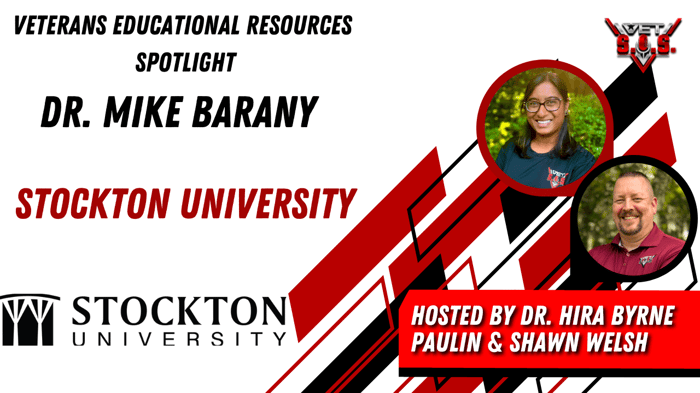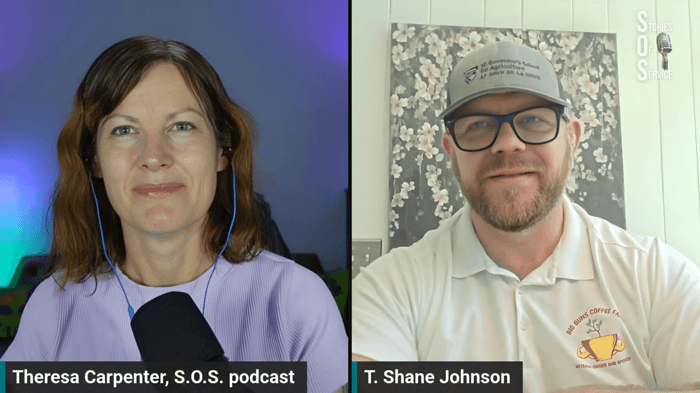Mastering Military Transition: Jeffrey Lodick’s Blueprint for Purpose After Service
Military transition is more than a job change—it's a life-altering shift that affects your career, identity, and sense of purpose. For many veterans, stepping away from military service means stepping into the unknown. In this special episode of the VET S.O.S. Podcast, hosts Shawn and Keith welcome Jeffrey Lodick, a retired Army Master Sergeant, veteran advocate, and host of On the Other Side: Leadership After Transition.
Jeffrey brings decades of experience, both in uniform and in civilian life, and shares insights on how to make your military transition more than just a checkbox—it can be a transformation. His journey from soldier to servant-leader is one that resonates with thousands navigating the same path.
The Emotional Toll of Military Transition
 Jeffrey Lodick
Jeffrey LodickFor Jeffrey, military transition wasn’t just about finding a new job—it was about redefining who he was without the rank, routine, and responsibilities he had carried for over 20 years. Although many focus on employment, he quickly learned that the real challenge lies deeper.
“Transition isn't employment,” he says. “Employment is a part of it, but military transition is so many other things.”
He recalls the moment that hit hardest—not when he left the military, but when he handed back his government-issued BlackBerry. The constant buzz of calls and messages that once validated his importance went silent. That silence raised a difficult question: “Am I still valuable?”
This emotional undercurrent is one that many service members experience but few talk about openly. The journey includes grief, confusion, and a profound search for identity—and it’s crucial to acknowledge those realities.
From NCO to Advocate: Jeffrey Lodick’s Journey
Jeffrey Lodick didn’t just transition—he transformed. After retiring from a 20+ year career that included roles as a jumpmaster, pathfinder, and in key leadership positions, he made it his mission to support others in their own military transition journeys.
 In 2018, he helped bring FourBlock, a nationally recognized transition program, to Tampa. Since then, the program has expanded into Orlando and Jacksonville, serving thousands of veterans and their families. He also supports organizations like Project Transition USA, which offers LinkedIn workshops and networking opportunities to service members preparing for civilian life.
In 2018, he helped bring FourBlock, a nationally recognized transition program, to Tampa. Since then, the program has expanded into Orlando and Jacksonville, serving thousands of veterans and their families. He also supports organizations like Project Transition USA, which offers LinkedIn workshops and networking opportunities to service members preparing for civilian life.

Jeffrey’s efforts are about more than services—they’re about building community. He believes that transition is not a solo journey and that no veteran should feel like they’re navigating the civilian world alone.
Who Do You Want to Serve? A Game-Changing Question
One of the most powerful takeaways from the episode is Jeffrey’s guiding question:
“Who do you want to serve?”
Instead of focusing on job titles or industries, Jeffrey encourages service members in military transition to think about purpose. Whether it’s serving fellow veterans, supporting underserved communities, or advocating for a cause, identifying who you want to serve can unlock clarity and direction.
Once you know your mission, everything else—skills, roles, and opportunities—can align with that purpose. It's a mindset shift that moves the focus from what you were to who you want to become.
The Power of Podcasting in the Transition Space
Back in 2017, when resources around military transition were still growing, Jeffrey launched his podcast On the Other Side: Leadership After Transition. His goal was to bring real, raw stories from service members who had recently transitioned—and it worked.
He gave veterans a voice, a space to be vulnerable, and most importantly, a platform to share lessons learned. Today, he mentors other aspiring podcasters, including VET S.O.S. host Shawn, without hesitation—even if they technically “compete.”
Why? Because helping others share their story multiplies impact. And in the world of military transition, every story matters.
The Mentorship Mindset
Jeffrey and the hosts discuss the importance of mentorship in the military transition process. As Keith puts it, “Find a mentor—find ten.”
Jeffrey emphasizes that mentorship can come from unexpected places. It doesn’t always have to be a superior officer or someone older. In fact, many of the people who helped him most during his post-service journey were former subordinates or peers.
He warns against ego: “Some people don’t want to reach out to someone who used to work for them. But if you did right by them, they want to help you.”
This philosophy—one of humility, collaboration, and continuous learning—is essential for a successful military transition.
Tampa: A Hub for Transitioning Veterans
Jeffrey highlights the growing ecosystem in Tampa, Florida, as a model for what strong community support looks like for transitioning service members. Through a combination of non-profits, government programs, and grassroots organizations, Tampa has become a powerhouse for military transition success.
Organizations mentioned include:
FourBlock
Project Transition USA
The Honor Foundation
Hiring Our Heroes
The COMMIT Foundation
These programs offer a variety of services, from career guidance and resume building to executive education and leadership development.
More importantly, they offer something many veterans lack during transition: connection.
Lessons for Life After the Uniform
As Jeffrey reflects on his military transition, he acknowledges that it's still ongoing. After seven years with the same company post-retirement, he’s in another phase of transition, once again evaluating his purpose and next steps.
His key advice?
Identify who you want to serve.
Define your lifestyle needs and align career goals accordingly.
Engage in intentional networking.
Don’t be afraid to start over—but never start from scratch.
Give back when you can—because others gave to you.
Transition doesn’t end with a job offer. It’s a journey that continues as you grow, evolve, and rediscover your identity outside the uniform.
A Rising Tide Lifts All Boats
One of the most compelling themes in this episode is collaboration over competition. In a space filled with over 40,000 veteran service organizations, there is no room for ego. With more than 200,000 service members separating from the military each year, the need is too great.
Jeffrey puts it plainly:
“You and I can read the same book and tell the same story, but someone wants to hear it from you. Someone else wants to hear it from me. And that’s okay.”
By sharing space, stories, and strategies, we create a ripple effect—impacting not just one life, but hundreds.
Final Thoughts: Why Military Transition Is a Lifelong Journey
Military transition is not a one-time event. It’s an ongoing process of growth, reflection, and reconnection. Whether you’re six months out from your ETS date or six years into your civilian career, there are always new lessons to learn and people to help.
Jeffrey Lodick’s story reminds us that purpose doesn’t end with your DD-214. In many ways, it begins there.
So if you’re struggling to find your way, ask yourself:
Who do I want to serve?
From there, build a new mission—and then go out and complete it.





